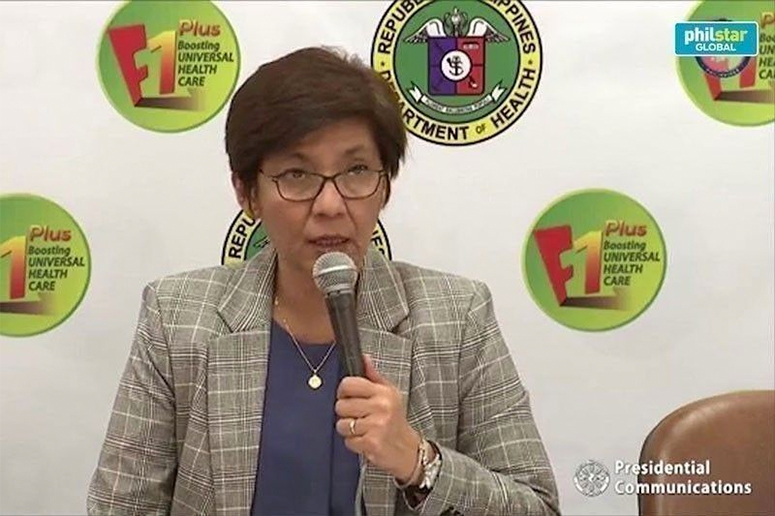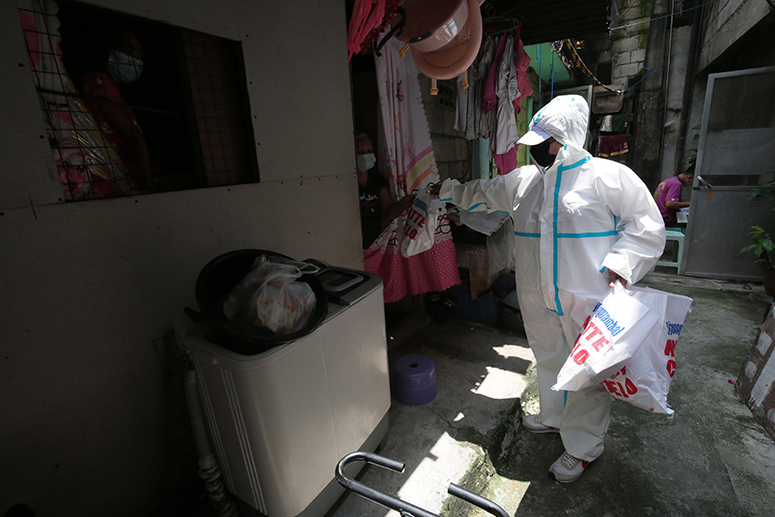DOH Undersecretary Rosario Vergeire: Cool, calm, composed
Even in the worst of times before an anxious, sometimes angry public, Health Undersecretary Maria Rosario Singh Vergeire has always been the picture of calm as spokesperson of the department.
The health department is not particularly popular at the moment, but frustrations over its response to the pandemic have never been directed, nor absorbed, by Vergeire. She has succeeded in being above the hue and cry, without being evasive or inaccessible. On the contrary, she has remained a steady and reliable source of information, but has remained detached from politics and political issues. Trabaho lang, ika nga.
Where does she get her composure and quiet confidence? Vergeire, a mother of grownup sons, admits she wasn’t always as confident before the glare of the public eye. But she has a template for facing inquisitive minds and arguments — motherhood.
“Unang-una, nanay ako eh (First and foremost, I am a mother),” she replied when asked from where she draws her calm during a Zoom interview with PeopleAsia magazine and this writer. “At home, I have to balance things. When you are talking to your children, you can’t just raise your voice. Kasi binata na mga anak ko (My sons are grown-ups now). Secondly, I think it’s because I am a professor.”

Vergeire, who has been with the DOH since the Aquino administration, has been teaching health system reforms in the Development Academy of the Philippines since 2008. Her students include local government officials and doctors.
“So, you require a lot of patience, especially when you talk to local officials. You want to guide them and yet being local officials, they know what’s happening in their areas. I-cha-challenge ka nila kapag ganon (They will challenge you in that case.) So I had to learn patience — I had to make sure that when I answered their questions, I would be exact but at the same time, I would let them feel that I understood them.”
If I leave my phone unattended for maybe 20 minutes, there would be about 78 unread messages from all my Viber groups when I return. We have an exchange of pieces of evidence, articles, posted by experts.
Vergeire, who comes from a closely-knit family from Marikina, also teaches part-time at the Ateneo’s School of Government. Her students include local executives and health officials from all over the Philippines.
“I learned how to balance things. You have to see their side because they’re on the ground. But, you, as a policymaker, kailangan ibenta mo sa kanila yung sinasabi mong polisiya (You have to convince them about the policy you are advocating.) I think these experiences through years of teaching have given me confidence in front of the public, and have taught me focus — ito lang ang pag uusapan natin (we will limit the discussion to this) and I would be very calm with you and patient with you because I want you to understand.”
Vergeire, an alumna of the University of Santo Tomas (where she took up Zoology) and the De La Salle Medical and Health Sciences Institute, nowadays makes do with only five hours of sleep.
“If I leave my phone unattended for maybe 20 minutes, there would be about 78 unread messages from all my Viber groups when I return. We have an exchange of pieces of evidence, articles, posted by experts. The bottom line is, you have to read them all because all these Viber groups are connected to my work. I have to respond to them also if the question is directed at the DOH. Before you finish reading all of them, you realize it’s midnight! Then you wake up at 5 a.m. to get ready for office,” she shares, unperturbed by her hectic schedule.
Career executive
Working in government is nothing new to Vergeire, who joined the city government of Marikina after passing the board exams. During the Aquino administration, she was the deputy director general of the Food and Drug Administration, “the first big assignment that was given to me by the previous administration.”
After that, Vergeire, who has a master’s degree in Public Health from UP Manila, was promoted to Director III. She was then placed in the regulatory office as a director in the Department of Health.
Thus, when she faces the “firing line,” she herself is armed to the teeth — with knowledge, experience, and patience.
We cannot be in lockdown forever,. We recognize that but for us, there should be safeguards. There would always be a compromise between the lives of people and livelihood.
From the point of view of a health professional and a member of the government’s Inter-Agency Task Force for the management of emerging infectious diseases solutions, how does Vergeire think the country can balance the need to open up the economy while keeping active COVID cases down?
“We cannot be in lockdown forever,” she asserts. “We recognize that pero ang sa amin lang, dapat may safeguards (for us, there should be safeguards). So when we look at this, there would always be a compromise between the lives of people and livelihood.”

One of the DOH’s roles, she stresses, is to install the safety brakes, “Para hindi naman nila buksan nang buksan yung ekonomiya tapos ang daming nagkakasakit. (So they don’t just open the economy while a lot of people get sick.)”
Vergeire, who supports granular lockdowns, says that when they analyzed why previous lockdowns resulted in lower cases compared to the latest lockdown, they realized, “It was because people went out more this time. You could not keep people at home because they had to earn a living. So we said, that’s a signal already; we cannot keep on locking them inside their homes. We have to find an alternative while keeping them safe.”
Her group conducted analyses on specific areas and she discloses that data shows where the “burden of disease” is.
“In the National Capital Region, we saw that 13 percent only out of the totality of barangays comprised 80 percent of infections.” Meaning — 87 percent of barangays in Metro Manila, “are not high risk.”
“So, we said, it is irrational to lock down the entire area when we should focus on specific areas?” she adds.

“So, we said, let’s do granular lockdowns and give the local governments the authority to decide which areas should be on granular lockdown. What national government will do in parallel and in support, is to enable you. Tutulong kami sa inyo, may pagkain kayo. (We will help you. You will have food.)”
At the end of the day, Vergeire is who she is because she has always taken the role of a working mom seriously — walking the tightrope of home and career, of work and rest, and always, always keeping her balance.
In these times that call for balance, the lady’s got experience.


